Top 8 Côte d'Ivoire Culture, Customs, and Etiquette
The culture of Côte d'Ivoire is layered and colorful thanks to the nation’s geographical location, collection of ethnic groups and years under French ... read more...occupation. The local communities are very welcoming to tourists. They offer traditional ceremonies, arts, crafts, food and dances, so that visitors can discover the rich and diverse cultural heritage of the Ivory Coast. Here is a list of Côte d'Ivoire culture, customs, and etiquette that Toplist provides you.
-
Ivorian nationals also have their local eating and cooking habits. In villages and families which are still very attached to their traditions, it is common for people to eat with their fingers. As regards Ivorian cuisine, the most favorite dishes are the attiéké which is made of cassava and generally accompanied by meat or fish in sauce, the kedjenou which is steamed chicken with vegetables in banana leaves, and the n'voufou which is a banana or yam mash mixed with palm oil and accompanied by an eggplant sauce.
Ivoirians are hospitable, generous people who enjoy inviting others to join for a meal. In a typical village, villagers sometimes eat together in a common area. They believe that food gives the body nourishment but also unites the community. Women and girls are in one group, young boys in another, and men in the third group. Most villagers eat on a large mat placed on the ground. With their right hand (the left is considered dirty), villagers will scoop up their food from large bowls placed in the center of the mat for everyone to share.
The eldest villagers eat first in order to detect contaminated food. If bad food is found, they will stop the younger members from eating it. Once everyone has begun eating, it is considered rude and selfish to reach across the table. Villagers want to make sure that everyone receives an equal amount of food. Coughing, sneezing, and talking during the meal are discouraged. If a person needs to cough or sneeze, they will exit the table before doing so. After the meal is over, a bowl of water is passed around to cleanse the hands. Talking amongst the villagers will resume as the diners relax to digest their meal.
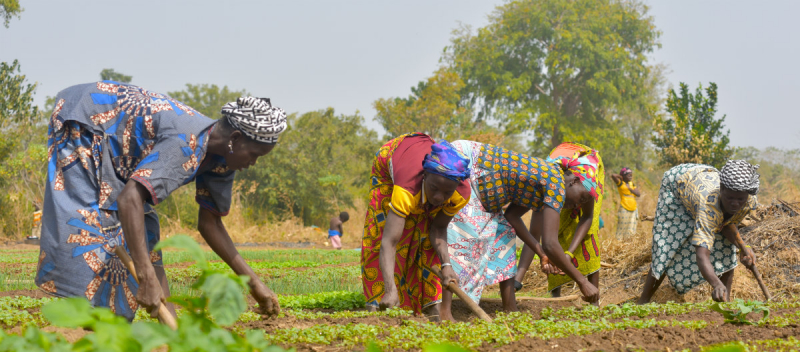
wfp.org 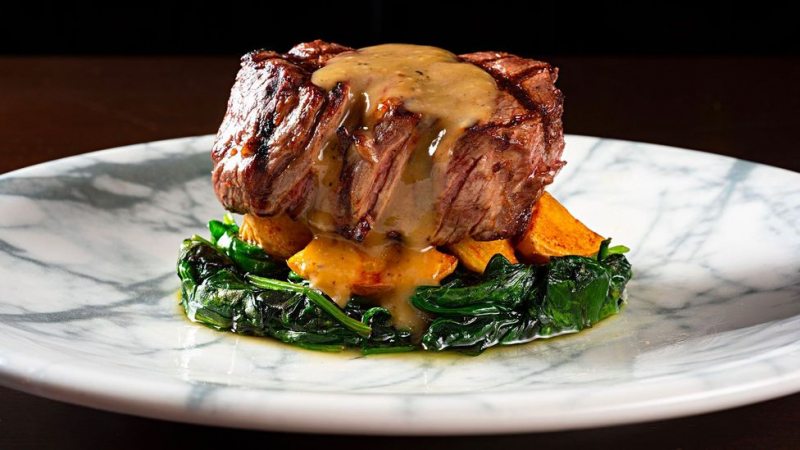
-
As in most of the developing world, people wear both traditional and Western clothes. In cities and towns, most people wear Western clothing—pants or blue jeans and shirts. However, many women still wear traditional brightly colored dresses (pagnes) with matching head scarves. Traditional clothing is most common in rural areas. Women wear pagnes or blouses with long pieces of cloth that they wrap around themselves as skirts. Men wear shorts or wrap short pieces of cloth around their bodies. Many men have long, beautiful robes for ceremonial occasions.
Kita clothing, which originated in both Ghana and Ivory Coast, is worn on special occasions and official ceremonies such as traditional weddings. Kita is handcrafted by weaving cotton or silk threads in a variety of colors between them. As a result, long strips are formed and connected one after the other. This is regarded as an ancestral cultural heritage passed down from generation to generation. However, because the Kita has different colors with different meanings, colors such as yellow, green, and blue are the most common colors worn for traditional weddings on Ivory Coast. The black color is only mentioned to express mourning.
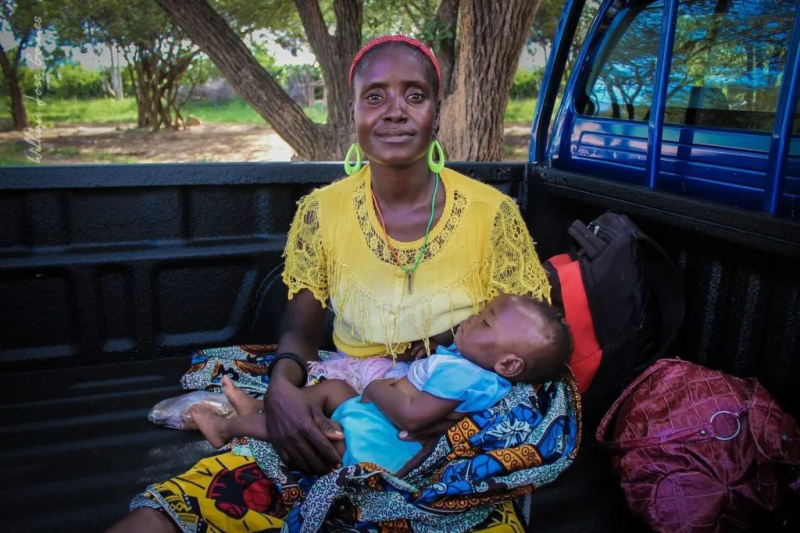
trafalgar.com 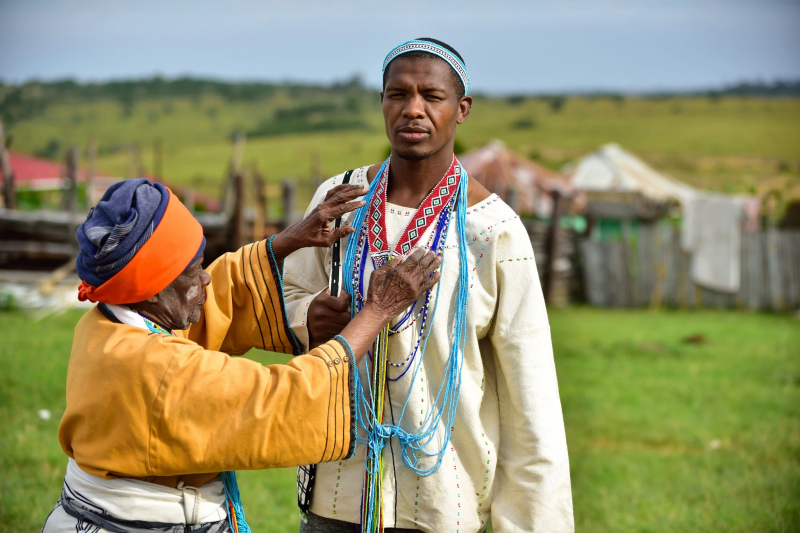
theculturetrip.com -
These are obviously fundamental and critical to making a good first impression in any culture. The handshake accompanied with eye contact and a smile is the most common physical greeting in Côte d'Ivoire. Stories of shaking hands for ten minutes while asking questions about each member of the other person's family are exaggerated unless you're going to a village. Handshakes, on the other hand, are an important ritual not only the first time you meet someone, but every day. Take the time to shake everyone's hands when you arrive at work in the morning.
As you get into slightly friendlier relationships, women-to-women and men-to-women greet with French-style cheek kisses; three alternative pecks, starting by heading right (touching left cheeks). For men, you may arrive at the male-to-male version of this – touching alternately the upper sides of your head, but this is for very close friendships and used infrequently or in more traditional settings.
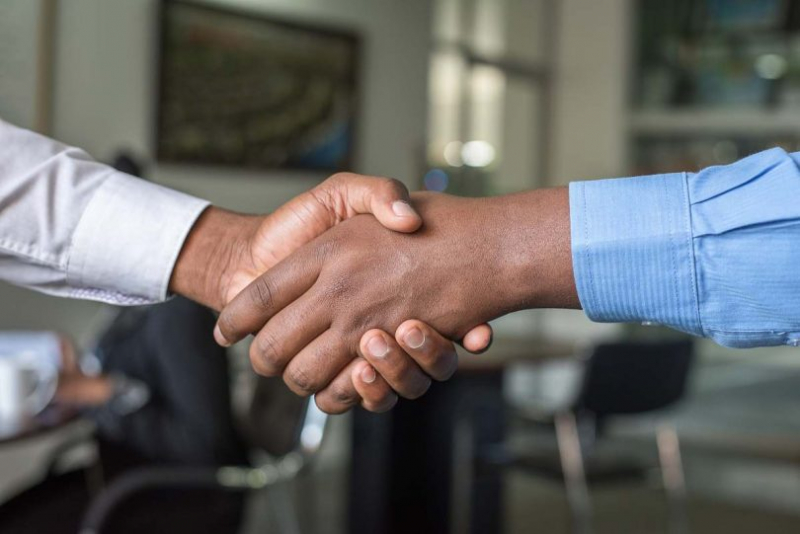
seeafricatoday.com 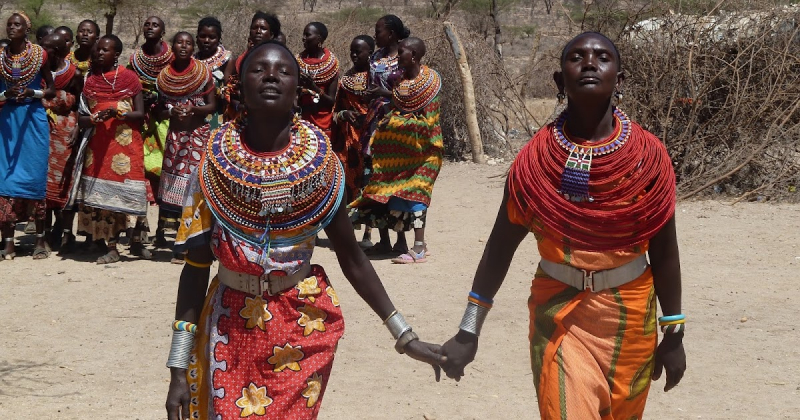
seeafricatoday.com -
In Cote d'Ivoire, the dowry is a condition of the legitimacy of any union because it is an obligation for the fiancé to acquire this customary obligation since the girl is considered a source of human wealth by her fecundity and by her work (labor at home) before concluding the marriage. Therefore, it is important to understand the ceremony of the dowry, the physical presentation of the fiancés, and the celebration after handing over and accepting the dowry.
The wedding is celebrated by all the parents and the bride; the bride's parents provide a very delicious feast consisting of plantain called foutou, accompanied by the salty soup made from palm seed, fish, and beef, as well as some white rice with clear soup made from eggplant, chicken tomato, and lamb. They can also eat attieke, which is made from cassava semolina and served with fried fish.
Following a satisfying meal, the assembly devises dance steps to the sound of the "tam-tam," a musical instrument made of wood and cow skin; the sound is accompanied by clapping hands to create an interesting rhythm. The couple moves to the middle of the dance floor to dance in a majestic way; those present pour banknotes on them to show their affection. After that, the bride will face the reality of marriage and married life alone.
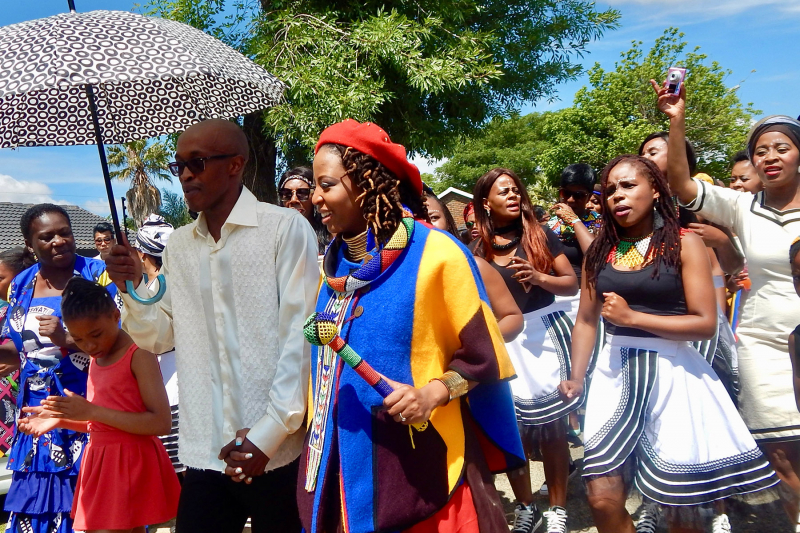
expatica.com 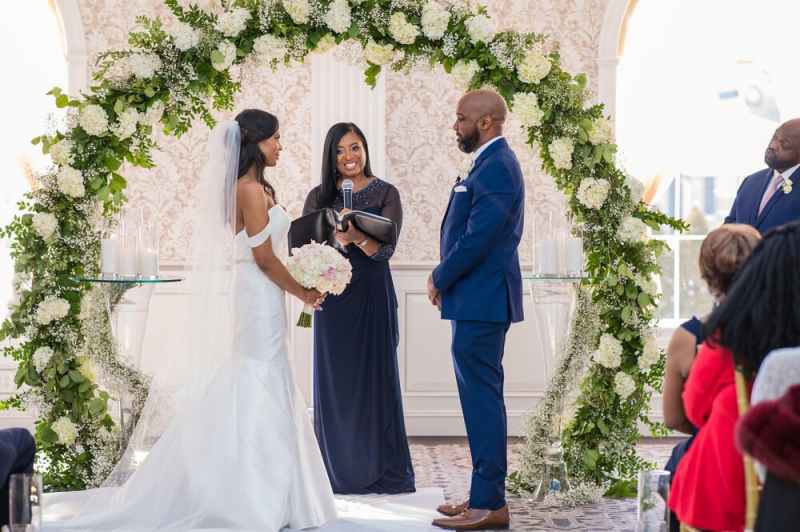
weddingsbyaretha.com -
One of Côte D'Ivoire's most famous festivals is the Fêtes des Masques (Festival of Masks), which takes place in the region of Man. Numerous small villages in the region hold contests to determine the best dancers and to pay homage to forest spirits who are embodied in elaborate masks. Another important event is the week-long carnival in Bouaké each March.
The Fête du Dipri in Gomon, near Abidjan, takes place in April. This festival starts around midnight, when women and children sneak out of their huts and, naked, carry out nocturnal rites to exorcise the village of evil spells. Before sunrise the chief appears, drums pound and villagers go into trances. The frenzy continues until the late afternoon of the next day.
Ramadan is the most important Muslim holiday, during which everyone fasts from sunrise to sunset by the fourth pillar of Islam. Ramadan concludes with a massive feast, Eid al-Fitr, during which everyone prays together, visits friends, exchanges gifts, and stuffs themselves.
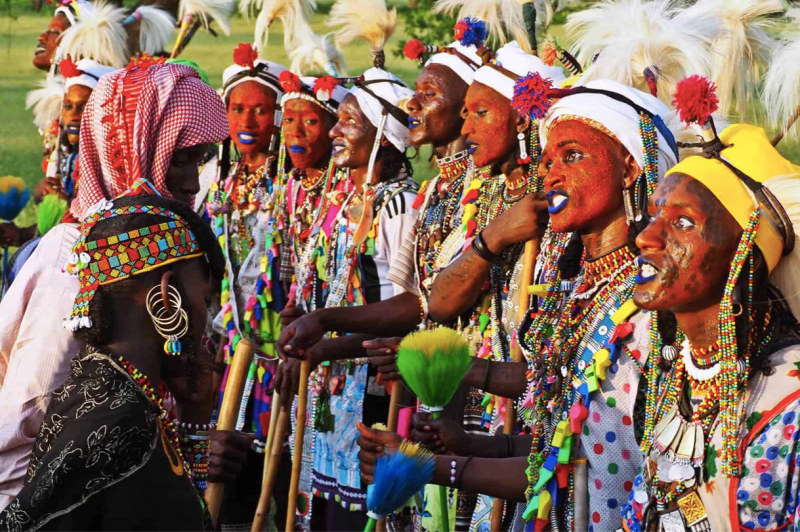
waafashion.com 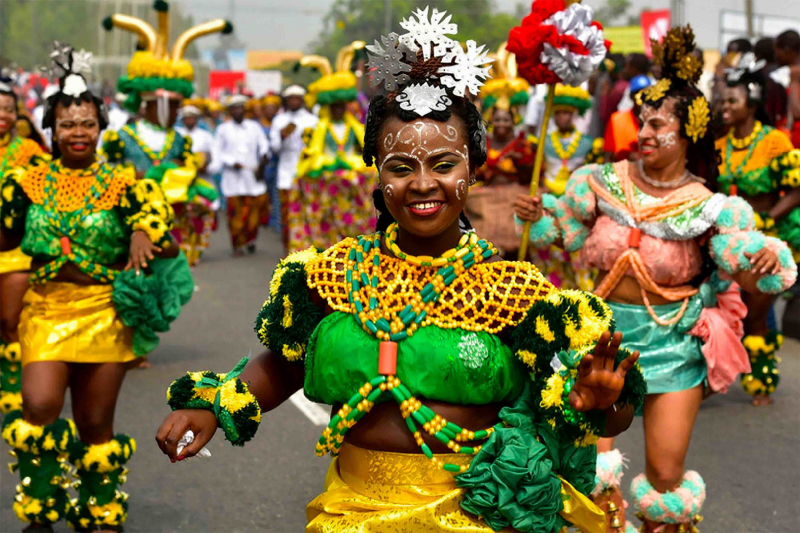
africanvibes.com -
Christians marginally outnumber Muslims in the contemporary multi-ethnic, multi-religious Ivorian society. Ivory Coast is a secular state, and the country’s constitution provides for the freedom of religion. Religious identity in Ivory Coast transcends political and ethnic contexts. While tensions and clashes have occurred between different religious groups, they are mainly fueled by the pursuit of political domination. Throughout history, Christians, and Muslims, the dominant religions have lived peacefully, and this harmony was threatened by the civil war.
Each of the main religious traditions has its own practitioners, such as Christian priests, nuns, and ministers, Islamic clerics, and the priests and diviners of traditional religions. In Islam, a significant religious authority is the marabout—a miracle worker, physician, and mystic who exercises both magical and moral authority. He is also respected as a dispenser of amulets, which protect the wearer against evil.
In the south, Akan religious practitioners include lineage heads, village chiefs, and priests who officiate at ritual observances for cults honoring specific deities. These priests also act as diviners, many of whom are believed to be clairvoyant and able to locate the source of spiritual difficulty for their followers, who consult them for a fee. Priests sometimes act as doctors, since many diseases are believed to have a spiritual basis.
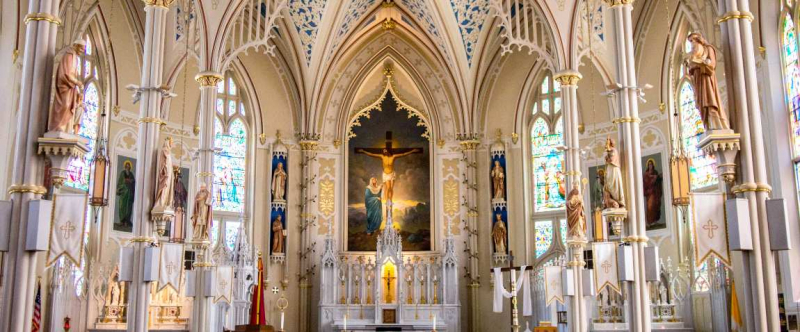
pickvisa.com 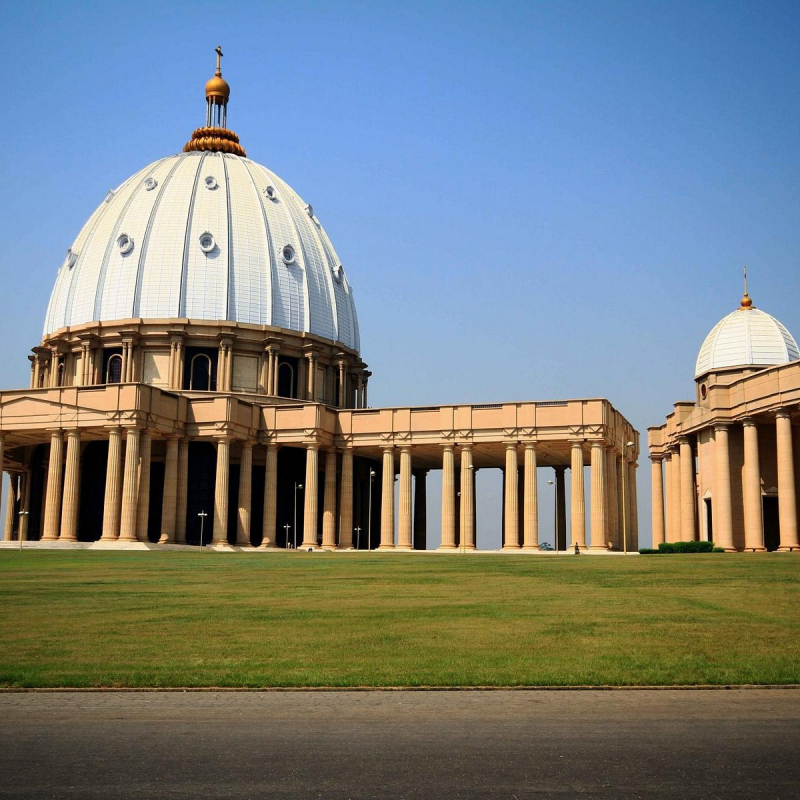
tripadvisor.com -
French is the official language of Côte d’Ivoire. Business correspondence, catalogs, and advertising materials prepared in French are essential to be readily understood by potential buyers. Business cards or "cartes de visite" are widely used. Members of the expatriate community and those who have received their schooling abroad frequently use academic titles and degrees.
As a rule, business customs in Côte d’Ivoire are similar to but perhaps more formal than customs in the United States. Ivoirian managers in large commercial enterprises tend to follow a Western business dress code comparable to that of any large U.S. city. U.S. businesspeople ordinarily use their firm's name and have their title translated into French. Tropical-weight suits and clothing are appropriate throughout the year and an umbrella is essential during the April to July and October to November rainy seasons. Some businesses close during the month of August for vacation, and high-level officials generally take a break. Additionally, some businesses and shops close for lunch from 12:30 p.m. until 2:30 – 3:30 p.m. Banks are open until 4:00 PM on weekdays.

afktravel.com 
expatica.com -
The diversity of culture in Côte d’Ivoire is truly remarkable, with over 60 indigenous ethnic groups, each with their own unique traditions. Different regions of the country have distinct music, art, festivals, and languages. The Ivoirian cuisine is influenced by neighboring West African countries, and most dishes include tubers and grains. Food is frequently served with attiéké, or grated cassava, a popular side dish. Maquis is a type of braised chicken or fish that is smothered in tomatoes and onions.
Music is also an important part of life in the Ivory Coast, and while each ethnic group has its own interpretation of traditions, some rhythms and melodies are universal. Music is used in a variety of occasions, including weddings and funerals. To express various emotions, various instruments such as the talking drum, kpalogo, djembe, shekere, cleavers, and akombe are used. These are made by hand from indigenous materials such as animal skins, gourds, and horns.
The most iconic Ivoirian art is the mask. The intricacy and variety of designs are truly impressive as these cultural symbols serve many purposes. They represent lesser deities, higher spirits and even the souls of the deceased. Ivoirians also produce ceremonial masks, each representing an entity. Wood carvings, fabrics and pottery are also popular art forms.
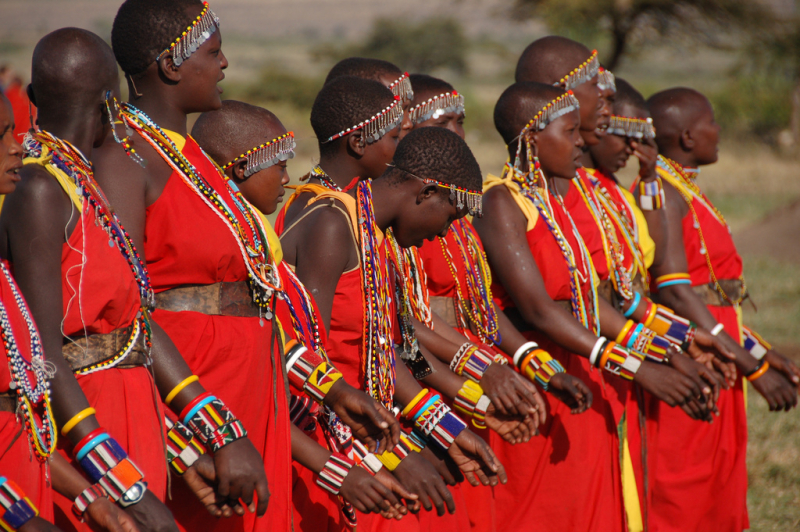
africanbudgetsafaris.com 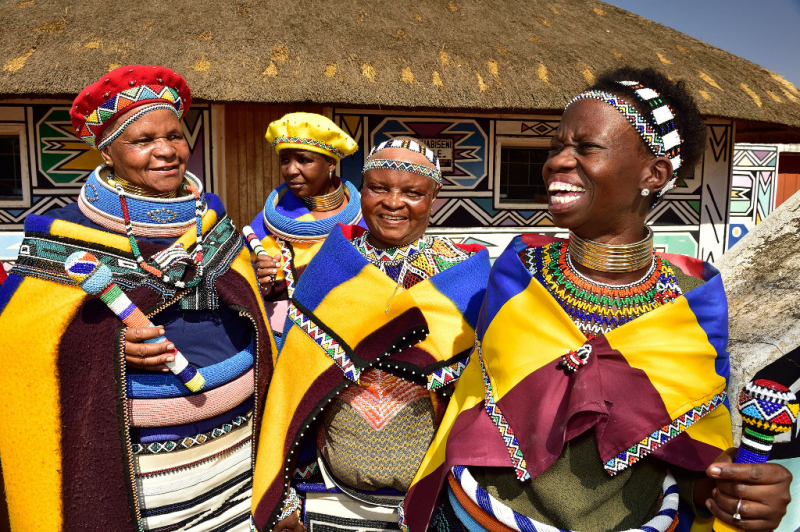
africanbudgetsafaris.com





























